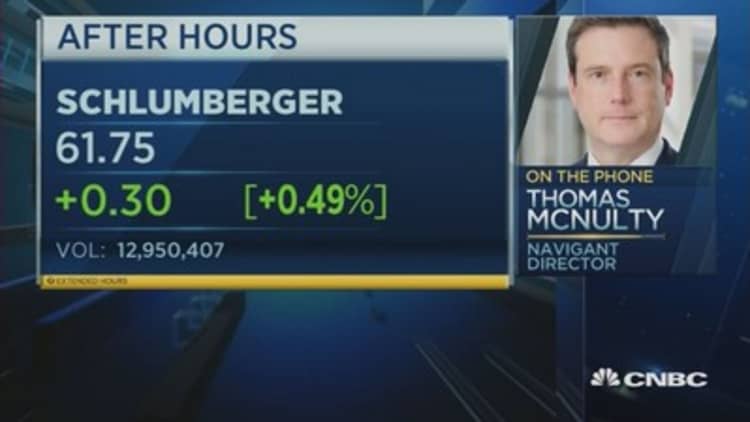


The oil price slump is hitting home with layoffs and spending cuts but there may be one positive development amid the rash of bad news: companies are tightening their belts more swiftly.
"The silver lining is the velocity--how fast all of these companies have moved to cut cost and build efficiencies. It's measured in weeks and months while in previous cycles it would take much longer," said Thomas McNulty, a director at consultancy Navigant Capital Advisors, .
This should enable companies with healthy balance sheets to stay in the green, he told CNBC's The Rundown.
Oilfield services giant Schlumberger was the latest casualty from the oil crash, posting its first quarterly loss in 12 years, prompting the company to cut another 10,000 jobs and initiate share buybacks, the company said on Thursday.
Oil prices have slumped 70 percent since they started their extended decline in the summer of 2014 with both U.S. WTI light sweet crude and European Brent moving just below $30 a barrel in Asian hours on Friday after hitting 12-year lows recently.
The persistently low price is due to a supply surplus with the boom in shale oil contributing to the glut exacerbated by the refusal of producing group OPEC to cut its 30-million-barrel-a-day production ceiling. Saudi Arabia, the most influential member of OPEC is sticking to its strategy of low-cost production to squeeze out higher-cost producers elsewhere.
The strategy however is taking longer than Saudi expected, contributing to its record high deficit in 2015 and spurring the country to introduce austerity measures such as cutting energy subsidies.
"Some of the players in the Middle East may have the ability to produce at lower cost but they are also paying for everybody's education, they are paying for infrastructure, they are basically national companies and that allows a lot of the free market competitors in North American to find a way to make money at lower prices for longer and to compete. They are built to compete head to head every day and it's very different with the national oil companies," said Navigant's McNulty.
The rout is prompting a flurry of price downgrade with ratings agency Moody's the latest to cut its 2016 price estimates for crude-oil prices, to an average of $33 a barrel this year for both WTI and Brent, $7 lower than its forecast for WTI and $10 lower than its previous forecast for Brent.
"Today's large global inventories will still take time to unwind and will continue to drag on prices even as demand picks up," said Terry Marshall, a Moody's Senior Vice President
The U.S. Energy Information Administration reported Thursday that nationwide crude stocks rose by 4 million barrels, more than the forecast 2.8 million barrels.
In a confused market, there are contrasting price forecasts.
Michael LaMotte, an oilfield services analyst and senior managing director at Guggenheim Securities expects supply to tighten, driving prices to $100 a barrel by 2018.
"What we have right now is an overproduction problem, not an excess supply or an excess capacity problem," he said.
With $30 a barrel oil prompting a supply response in terms of lower capital expenditure, LaMotte expects U.S. onshore production to decline by 1.2 million barrels a day in the next 12 months, prompting the market to drawn down on inventories from the second quarter onward to meet demand.
Another $500-600 billion will be needed to ramp up production to increase by 1 million barrels a day from 2018 in the U.S—far below the $50-60 billion that the sector is generating this year, he said.
"It's going to take a lot higher oil prices and a lot of capital markets activity to generate the amount of cash that will be required to deliver the production that the world needs just a few years from now."


